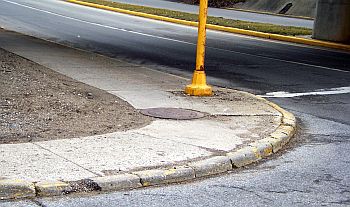 03/05/12 Members of the Plymouth Common Council heard a presentation of the City’s Americans with Disabilities Act (ADA) Transition Plan during their meeting last week.
03/05/12 Members of the Plymouth Common Council heard a presentation of the City’s Americans with Disabilities Act (ADA) Transition Plan during their meeting last week.
The purpose of the plan is to ensure that the City creates reasonable, accessible paths of travel in the public right-of-way for everyone, including people with disabilities. The City had made a significant and long-term commitment to improving the accessibility of their pedestrian facilities. The Transition Plan identifies physical barriers and prioritizes improvements that should be made throughout the City.
 The City has a two-tiered system to identify and assess obstacles in the public right-of-way: a Preliminary Evaluation and a Detailed Evaluation.
The City has a two-tiered system to identify and assess obstacles in the public right-of-way: a Preliminary Evaluation and a Detailed Evaluation.
The preliminary inventory evaluates three criteria for curb ramps and three criteria for sidewalks. This evaluation determines which intersections are obviously non-compliant to the ADA Guidelines and to get a comprehensive overview of the complete pedestrian network.
 The detailed evaluation of intersections looks at those identified as “potentially compliant.” These intersections require fieldwork measuring specifics for total compliance.
The detailed evaluation of intersections looks at those identified as “potentially compliant.” These intersections require fieldwork measuring specifics for total compliance.
The Transition Plan also spells out methods to removing barriers. Two factors are considered: location and accessibility conditions of the intersections. Priorities are placed on the intersections looking at intersections serving government facilities including schools, churches, and facilities such as the Boys and Girls Club and Older Adult Services. The second priority is commercial and employment centers followed by intersections in other areas, primarily residential neighborhoods.
 The inventory of intersections in the city shows 67 are in the high priority level while 63 have a median priority and 248 are ranked low priority.
The inventory of intersections in the city shows 67 are in the high priority level while 63 have a median priority and 248 are ranked low priority.
The City will begin to address the intersections and sidewalks associated with them as opportunity allows. Currently each City Council member has $6,000 per year to improve sidewalks in their districts. They would be required to consider intersections with a high priority in their neighborhoods instead of sidewalks and intersections that are ADA compliant. City Clerk Treasurer, Toni Hutchings said, “This is an important study and the selection process should be moved back to the Street Superintendent instead of $6,000 per councilman.”
 The City of Plymouth is providing opportunities for individuals to comment on the proposed Transition Plan. A copy of the plan is available at the Plymouth Public Library. It can also be viewed on the city’s website at www.plymouthin.com. The public comment period will end on March 26th and formal adoption of the Transition Plan is expected to be during the city meetings the evening of March 26th.
The City of Plymouth is providing opportunities for individuals to comment on the proposed Transition Plan. A copy of the plan is available at the Plymouth Public Library. It can also be viewed on the city’s website at www.plymouthin.com. The public comment period will end on March 26th and formal adoption of the Transition Plan is expected to be during the city meetings the evening of March 26th.











